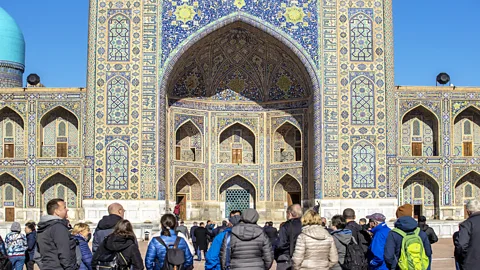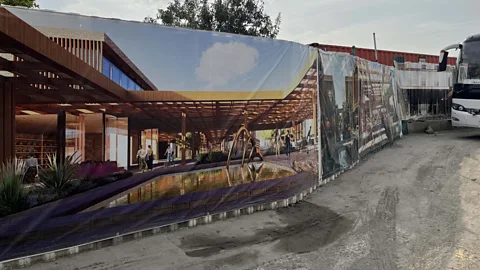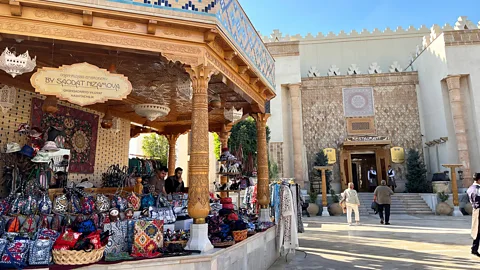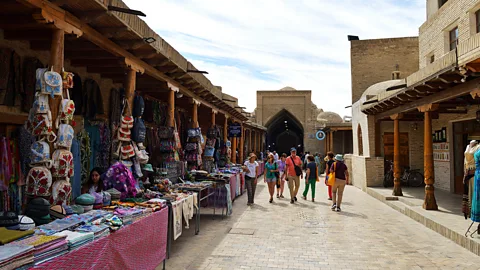'It risks becoming a Venice in the desert': The dark side of Uzbekistan's tourism boom
 Getty Images
Getty ImagesThe Uzbekistan government is on an ambitious tourism drive – but is sparring with heritage experts over how to protect its historical sites.
The sound of a jackhammer rattles through the air. In Bukhara, a former trading hub on the ancient Silk Road in what is now Uzbekistan, tourism is the new commerce and new hotels are popping up on every street corner. I've counted three construction sites in a 100m radius outside the former caravanserai where I'm staying, and I observe the progress of a guesthouse being built just metres from a 16th-Century madrasa (school).
It's a trend that's visible across the country. In the capital, Tashkent, construction work for a shopping mall lines the avenue leading up to the Hazrati Imam mosque complex, next to the shiny, almost-completed Centre for Islamic Civilisation. The small historic city of Khiva, surrounded by mud fortifications, cannot expand outwards – but mud-and-straw residences in the historic centre are being knocked down and replaced by modern hotels. It is perhaps most obvious in Samarkand, where billionaire businessman Bakhtiyor Fazilov has poured money into flashy projects to raise his home city's profile, such as a new airline, an international airport that opened in 2022 and the strange Disneyland facsimile Silk Road Samarkand, a soulless and sanitised tourist resort situated outside the city.
"The concept of the Silk Road is being applied to everything," said Svetlana Gorshenina, a researcher and member of the Uzbek heritage protection association Alerte Héritage. "You have Silk Road restaurants, Silk Road shops, Silk Road tours, tourist agencies uniquely dedicated to the Silk Road. It has become our only selling point and it's self-exoticising. It's a kind of self-orientalisation, which is a hangover from colonialism."
The thing is: it's working. The World Economic Forum's Travel and Tourism Development Index now ranks Uzbekistan at 78th out of 119 countries, moving up 16 places in the last five years. The Uzbek government is ploughing investment into its tourism sector after the country's president, Shavkat Mirziyoyev, laid out his Uzbekistan 2030 strategy in September 2023, an enormous governmental plan detailing the goals to be achieved in various sectors by that date. That includes increasing the number of foreign tourists to 15 million, more than double the 6.6 million visitors to the country in 2023. He has also called for the creation of "tourist clusters" – complexes providing accommodation and other services for tourists in one place.
 Catherine Bennett
Catherine BennettOne of these new clusters is the reason I've come to Bukhara. It's a 33-hectare site on the fringes of the old town on which a leisure complex called Eternal Bukhara will soon be built. Samarkand tycoon Fazilov has a hand in this project too: he's the chairman of one of Uzbekistan's largest contractors, Enter Engineering, which is building the complex. The company is cagey about its actual plans for the site – not least because it has already proven quite contentious.
Initial plans reported in the local press described it as an "ethnographic park" that would recreate traditional Uzbek buildings such as chaikhanas (teahouses), as well as restaurants serving Uzbek cuisine and a museum about Uzbek culture. But the 3D renderings pasted on the high walls that surround the construction site show instead blocky, modernist shopping arcades and glimmering pools adorned with abstract art.
"We're not trying to replicate historic buildings. We don't want to repeat history – but to create something that will have its own impact," Rustam Khaydarov, the deputy general director of Enter Engineering, told me, as we sat in a portacabin in the construction site with excavators and diggers whirring nearby. "It will be a place where people can relax, with cafes and a cultural centre for local artists to display their art. And about 70% of it will remain a green site."
Enter Engineering also plans to build a number of five-star hotels, with up to 700 rooms on site. "Wealthy people already come to Bukhara but are dissatisfied with the quality of the hotels. So we want to improve the class of hotels on offer," he said. There will also be medical facilities to cater to a new type of tourist that Uzbekistan is trying to attract: visitors who come for cheap healthcare, from dentistry to plastic surgery.
 Catherine Bennett
Catherine BennettThis area used to be Bukhara's administrative zone, with government offices and a large public sports arena. The demolition of the sports stadium im 2024 provoked a public outcry (which is rare in Uzbekistan, a country where public dissent is swiftly silenced), and Enter Engineering responded by building three more sports facilities on the town's outskirts. The site is ringed by a road, beyond which there are drab and semi-dilapidated residential apartment blocks, with many ground-floor spaces for businesses unoccupied. Although it's just a short walk to Bukhara's tourist sites and monuments, it feels a world away from the relentless tourism of the city centre.
Get off the tourist trail
Many travellers head from Samarkand to Khiva but don't hesitate to go off the beaten path. Here are some ideas:
• Rent a car or book a tour to visit the ancient Khorezm fortresses and Zoroastrian sites on the road between Nukus and Urgench, where you can scramble around the desert ruins, poke into chambers and walk along walls that were built between the 4th Century BCE and the 7th Century CE.
• The city of Nukus is a rapidly developing tourist destination, known above all for the Nukus Museum of Art's extensive collection of Russian avant-garde art.
• Go to the Fergana Valley for a slower pace of travel. Spending time in a teahouse in a rural mountain village will give you a better understanding of how people live in Uzbekistan.
"For years, Uzbekistan has been undergoing a process of emptying city centres of their inhabitants," explained Gorshenina. "We are witnessing a transformation of towns into museum-towns that are made for tourists. In Bukhara, you already have this 'tourist zone' that is clearly separate from the rest of the town where residents live. It's become an open-air museum."
An Uzbek architect, who did not want to be named for this article but whom I met in his office in Bukhara, told me, "Every year, there are more and more tourists. I have always thought of Bukhara as a living organism, and that organism is becoming very weak and fragile. It should not become a town solely for tourists but for its residents as well. It risks becoming a Venice in the desert."
Alerte Héritage is fiercely opposed to the Eternal Bukhara project, in part because it says that locals were not consulted about the use of the space, and also because of the loss of important Soviet-era architecture, such as a government building that was the former regional headquarters of the Communist Party, built in 1987. It was torn down in early 2024.
The Uzbek architect said that the current government was repeating mistakes from the Soviet era. "The Soviet Union destroyed a lot of heritage and replaced it with Soviet buildings because it wanted to leave its own imprint. That tradition of demolition is still – unfortunately – in our blood."
 Getty Images
Getty ImagesAlthough Eternal Bukhara is not within the historical centre that is classified as a Unesco World Heritage site, it falls within the "buffer zone", which still requires Unesco validation before urban changes can be made. When contacted, Monia Adjiwanou, a spokesperson for Unesco, said that they were "closely monitoring" the situation, adding: "We hope that the authorities will comply with their commitments to the World Heritage Convention and that they will not carry out any demolition/construction project without the prior assessment of the World Heritage Committee in July 2025."
Demolition on the Eternal Bukhara site is visibly ongoing, with only a handful of buildings still standing. That seems problematic for Unesco – even more so as the international organisation plans to host this year's General Conference in Uzbekistan, which would be the first time since 1986 that the annual meeting has been held outside Paris.
More like this:
• Central Asia's glittering new Silk Road jewel
"Unesco is toothless, without principles. What has it really done for Central Asia, for Uzbekistan?" asked the Uzbek architect. Both he and Alerte Héritage are unconvinced by Unesco's warnings to Enter Engineering. Khaydarov, however, assured me that the company will not launch any building work until they get Unesco's green light – which means that they could still be waiting for months before construction is able to begin.
"We don't want the city's image to be damaged," Khaydarov said. "This is a reputational issue. But we chose this area because it's in the buffer zone and we are confident we will get Unesco's approval to continue."
He also insisted that locals support the plans, describing it as "a social project" rather than a commercial one. "We will create minimum 15,000 jobs with this site," he promised.
Uzbekistan's headlong rush into the world of mass tourism could well create thousands of jobs and boost the country's economy – but it risks bulldozing or damaging both the country's ancient heritage and vestiges of its more recent history. You only have to walk through Bukhara's covered bazaars that were once filled with Uzbek silk and crafts and are now teeming with imported, mass-produced goods to get a feel for what the country may look like in just a few years.
--
If you liked this story, sign up for The Essential List newsletter – a handpicked selection of features, videos and can't-miss news, delivered to your inbox twice a week.
